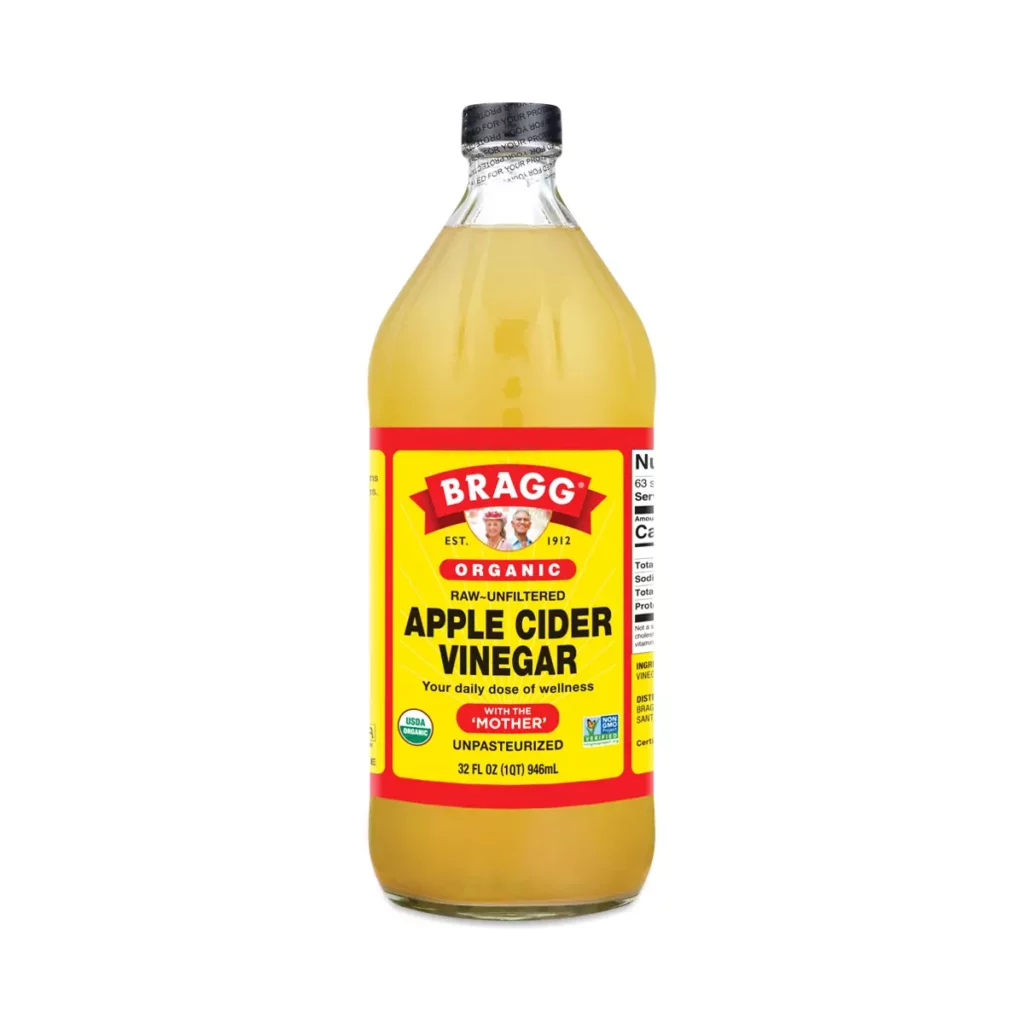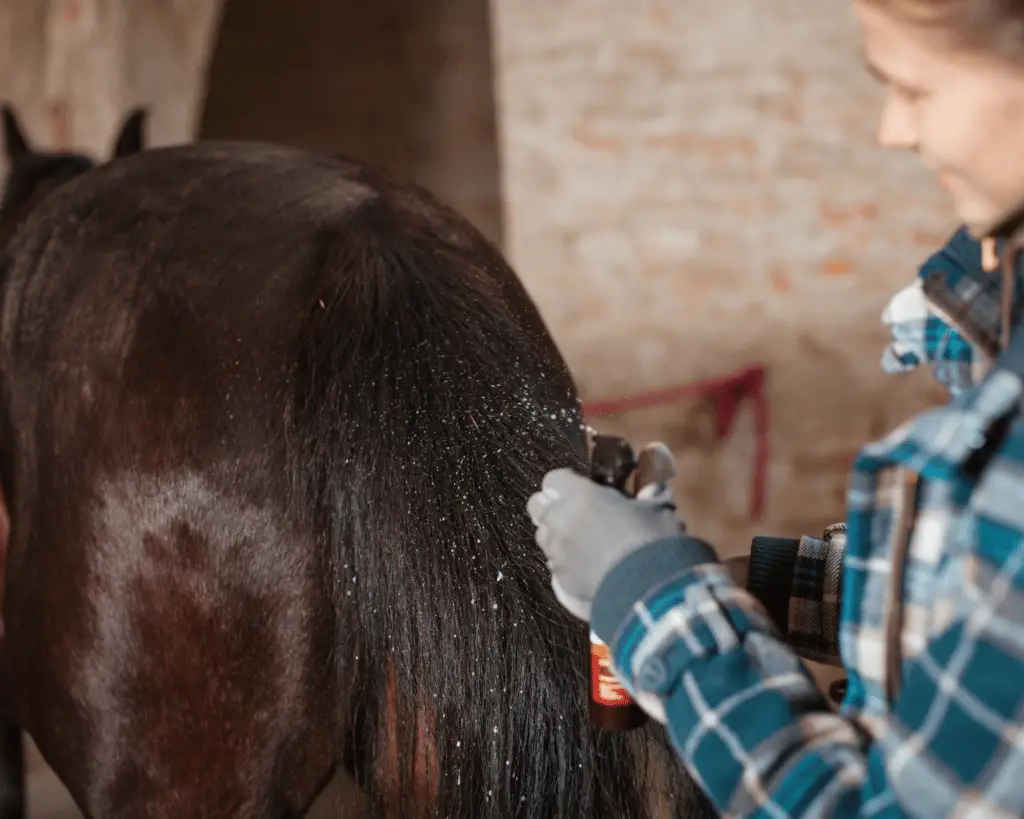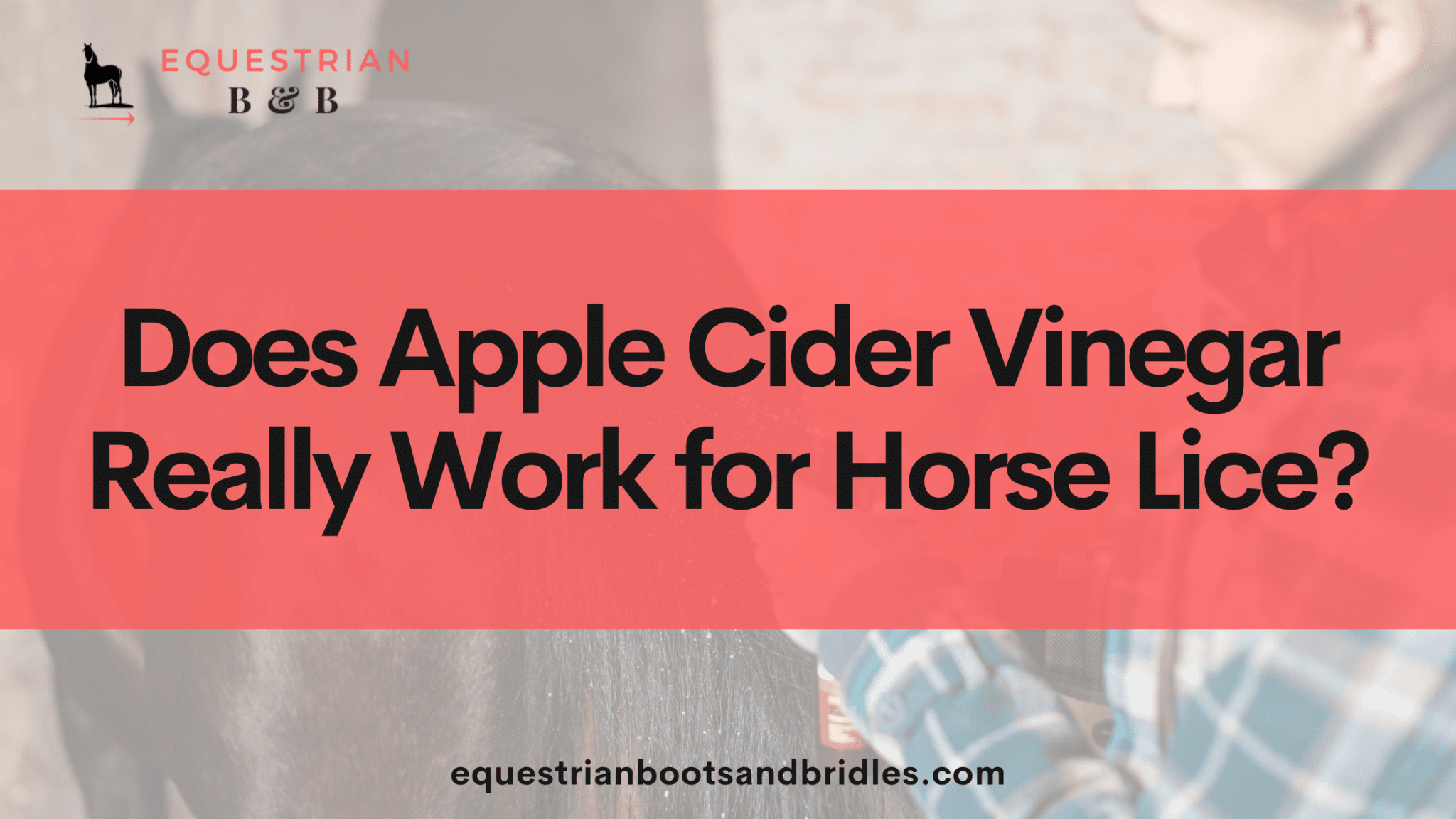Apple cider vinegar (ACV) is a popular cure-all remedy that’s in many a horseperson’s medicine chest. It’s an effective cure and preventative measure for a lot of issues: insect repellent, hair conditioner, rain rot treatment, and more. But does apple cider vinegar really work on horse lice?
Using apple cider vinegar for horse lice is said to kill the insects, but science has yet to fully prove its efficacy. It’s well-known that vinegar and ACV with the louse mother has beneficial properties for various reasons. However, ACV may not be strong enough to deliver the knockout punch to entirely kill off lice in an effective manner. There’s nothing wrong with using ACV as a supplement or to help a horse’s hair coat recover from a lice infestation, but it’s best used in conjunction with another lice-killing product to get the results you’re seeking.
(By the way, to read more about horse lice symptoms, identification, and more treatment options, click here.)
Why is Apple Cider Vinegar a Popular Home Remedy?
The core property of apple cider vinegar comes in the form of its acidic pH level. Fungus, bacteria, and microbes are unable to survive in vinegar and are quickly killed as a result. This makes ACV and distilled white vinegar an excellent wound wash, stomach treatment, and mold killer. Distilled white vinegar has a pH level of 2.5 and ACV comes in at 3. The pH scale is 1 (acidic) to 14 (alkaline), which puts vinegar at the high end of acidity.
A horse’s body works to maintain a level pH, as do the bodies of most mammals. Maintaining a specific pH helps the body regulate itself throughout the major and minor systems. Seeking to change the pH level for the purpose of killing lice will always be met with resistance from the horse’s body, and reduce the effectiveness of feeding ACV in general. However, ACV does provide benefits to the horse’s body and can help overcome deficiencies in local forage and make it easier for a horse to transition to a new food or water source.

Apple Cider Vinegar for Horse Lice May Only Provide Minimal Assistance
Apple cider vinegar is of limited use for treating lice in horses. There’s a theory that feeding a horse ACV causes it to secrete thiamine, a substance known to repel insects. However, feeding garlic has the same effect. Both are effective to some degree, and horse owners have reported mixed results. You may want to try it out to see if it works for you. If it doesn’t you’ll probably need to switch to a stronger method of lice treatment.
If you search the internet for home remedies for lice in horses, you’ll find there are a lot of sources recommending the use of ACV for horse lice. The fact is, ACV is one of the least effective topical or internal remedies for horse lice as it’s not usually capable of killing adults or removing nits from hair shafts. However, ACV does provide benefits to horses in other ways.
RELATED: Can humans get horse lice?
Does ACV Change the pH in the Horse’s Gut?
There’s a lot of speculation as to the role ACV plays in the horse’s digestive system. Some claims state that feeding apple cider vinegar for horse lice serves to change the pH of a horse’s blood to the point that lice won’t feed. No study to date has shown this claim to have merit, but there is some findings that ACV can reduce the size or prevent the formation of enteroliths in a horse’s gut.
Feeding or Treating a Horse With Apple Cider Vinegar Has Health Benefits
ACV has multiple health benefits for horses, especially when using it in line with its known properties. That is, using it as a fungicide, antibacterial, or antimicrobial effectively resolves a condition and restores an affected area to normal. It can be used on its own or in conjunction with another therapy to help resolve the given issue.
Using ACV as a topical fungicide on hooves is known to be effective in treating the condition. It’s also effective at treating skin fungus that’s found in leg feathers. Burns respond well to the use of ACV as it creates an environment that’s ideal for the body to repair itself and reduce the potential for infection. Washing a horse with ACV on occasion serves to strip the build-up of dirt and and residue, leaving the mane feeling smooth and looking shiny. ACV is also known to help horses with insulin resistance and metabolic syndrome.
One theory about ACV and horse lice is the concept that it stimulates the secretion of thiamine through the skin and repels insects as a result. This theory has yet to be studied scientifically which means it’s unknown if it’s truly effective, what is the amount you should feed your horse for it to be effective, or what exactly is the metabolic response that causes thiamine to be secreted through your horse’s skin.
Arthritic horses may benefit from being fed ACV as the acidic nature of ACV is thought to dissolve crystals that form in arthritic joints. It’s unknown if this actually works, but horses are not prone to placebo effect. An arthritic horse that shows improvement after being fed ACV is a horse that’s benefitting in some way from its consumption.
There’s nothing wrong with using ACV for any of these purposes, but your mileage may vary in terms of results. Seeing beneficial results is the goal of using ACV, and if you’re seeing good things from using ACV, by all means keep doing so!
Flavoring Feed and Water With ACV
Apple cider vinegar has a strong flavor that may be offensive to a horse’s palate. It’s wisest to slowly introduce ACV into your horse’s feed and allow them to adjust to the flavor. If you’re planning on feeding a cup of ACV a day, start with a quarter or eigth of a cup split up through each feed or watering. You can slowly increase the amount as your horse gets used to the flavor and accepts it as part of its meals.
Adjusting a horse to the taste of ACV in their water can help them stay hydrated when they’re away from home. Some horses don’t adjust well to the flavor of water in other locations and refuse to drink. They may associate the change in taste as poison, or just may not like it. Putting ACV into their water serves to normalize the flavor for the horse and encourages them to drink water from unfamiliar sources.

Can I Spray Apple Cider Vinegar on My Horse?
Yes, you can safely spray apple cider vinegar on your horse. It’s best to dilute it prior to spraying in case your horse’s skin is sensitive or you’re trying to prevent an open wound from becoming infected. Straight vinegar may sting and cause your horse to react poorly. Diluting the ACV with a little water helps reduce the sting while making sure it’s still effective.
Another popular use for ACV is as a fly spray. Mix 18 ounces of apple cider vinegar with 2 tablespoons of dish soap (any brand works) into a spray bottle. If it looks a little too thick to spray, pour in a little water for dilution. Once you’re satisfied with the mixture, shake the bottle and spray it at will onto your horse. (Just remember that there’s dish soap in the spray when you give your horse a bath and suds appear seemingly out of nowhere!)
Other Uses for Apple Cider Vinegar Around the Barn
ACV is an effective weed killer and cleaner for blankets and pads. You can spray undiluted ACV from a spray bottle directly onto weeds. If you’re looking to kill weeds in a larger area such as a pasture, you’ll want to use horticultural vinegar which is up to six times as strong as ACV.
Pads, wraps, and blankets pick up all kinds of nastiness and are frequently used on multiple horses. This means you may not know what’s lurking in your horse’s linens. Using a cup of ACV in the horse laundry serves to kill bacteria and fungus, effectively sanitizing everything prior to its next use.
Is it a Good Idea to Use ACV on Horses?
Apple cider vinegar does have its benefits, and you can use it safely on your horse without worrying about affecting your horse’s health. A majority of the benefits that are seen using ACV are anecdotal and there are few scientific studies behind the benefits of its use. The studies that have been performed had inconclusive results that couldn’t point definitively at a result.
Ultimately, using ACV for horses in their feed and/or as a topical spray can improve their health or appearance to a degree. It’s worth keeping in mind that it’s not a miracle worker; you probably won’t see immediate results in the killing of lice or better hair coats overnight. Using ACV should be seen as helping your horse’s overall health and functions for the long term.
TL;DR: In the long run, yes, using ACV can provide benefits for your horse. Manage your expectations wisely when using apple cider vinegar for any reason. You want to make sure you’re using just enough and not too little or much. Also keep track of the amount of ACV you feed to obtain results. This helps inform you of how much you should continue to feed, and how much to feed horses of similar size and weight for any use going forward.

